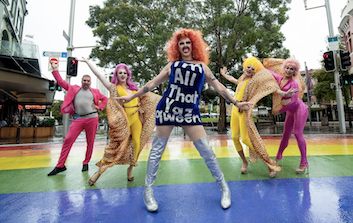
THE BURGER POLITICISED

Whataburger is a Texas based fast food chain that currently boasts some eight hundred and eighty locations and well over forty thousand employees. It was one of the pioneer burger chains dating right back to the start of the 50s. It’s sometimes alleged that the original stores refused to serve Afro-Americans and a number of critics point to their early restaurant photos asking “where are the Blacks?”.
Certainly, many of these seminal fast-food franchises were sanctuaries for whites only but the truth is that Jim Crow laws at the time enforced segregation in many Southern states, in particular Texas. Whether the founders of these franchises supported such a racist policy is open to debate.
So, what about 2022? Do the big burger behemoths have the kind of political agenda we should be worried about?
In Australia the leading chains like McDonalds and Hungry Jacks go to great lengths to present themselves as good and benevolent community citizens. They might be contributing to the obesity crisis but they are also supporting charities that support sick children and other medical areas. They also publicly subscribe to a policy of diversity and inclusion, with McDonalds stating:
“Guided by our values, we are committed to becoming better allies, better sponsors and better leaders – helping to empower the people and communities we serve.”
It’s a strategy that not only complies with current standards but makes excellent business sense, keeping their employees happy, maintaining good productivity and most importantly, making money. Any kind of workplace controversy or political endorsement is considered bad for business.
On the other hand, in the ultra-politicised environment that is the USA today, one fast-food chain has attracted considerable flak for its discriminatory practices. The curiously named ‘Chick-fil-A’ has upwards of three thousand outlets in the US and Canada and bills itself as ‘the home of the original chicken sandwich’. By golly they also do a fab peach milkshake, smothered in lashings of cream and a cherry on top.
The company was founded in 1946 by Samuel Cathy, a devout Southern Baptist and has always been guided by strict ‘Old Testament’ principles – closing on Sundays as well as Thanksgiving and Christmas Day. In keeping with their religious principles, they have donated heavily to a number of charities and pride themselves on being a philanthropic corporation. Amongst the recipients of their largesse have been a number of staunch anti LGBTQ groups such as the Fellowship Of Christian Athletes and the National Organization For Marriage.
They have also attracted criticism in the past for failing to safeguard the workplace for LGBTQ employees, supporting gay conversion therapy; in 2002 they had an out of court settlement with a Muslim employee who claimed he had been fired for refusing to pray to Jesus with other employees.
However, it now seems the company has had some kind of epiphany, one inspired by basic human rights or simply ‘good business practice’. They claim they no longer donate to anti-gay charities and that their future agenda will focus on promoting youth education, combating youth homelessness and fighting hunger.
Nevertheless, their previous policy of homophobia and other conservative causes has by no means damaged their reputation with many Americans and they maintain their status as one of the top four fast food chains in the US. Maybe they are looking to a global expansion in countries where their less than liberal previous stance would not be well received. There’s already a Chick-fil-A in Melbourne and in Auckland but whether they have plans to expand in this part of the world remains to be seen.
Amongst many Americans, including the substantial Christian right and other conservatives, Chick-fil-A is very much a part of their political/religious ethos. In 2012, former Arkansas Governor and two time presidential nominee Mike Huckabee promoted a “Chick-fil-A” Appreciation Day in response to a planned LGBTQ kiss-in at Chick-fil-A restaurants across the country.
We should be grateful that currently in Australia, as far as I know, the major fast food chains have no real political connections or associations with ultra conservative organizations. If they do, they are not telling, although they would certainly have their lobbyists in Canberra to protect their economic interests.
Finally, there’s a lot to be said for buying an old style burger here at the fast disappearing neighbourhood greasy Joe. The guy flipping them might be a card-carrying member of Australia First or One Nation, but he’s not letting on and there’s no way he’s donating any of his measly earnings to some wacko anti-LGBTQ cause. More beetroot on that burger thanks!









